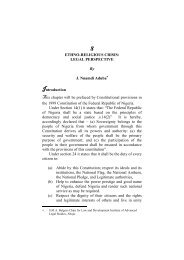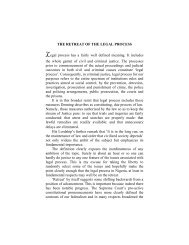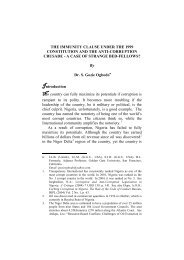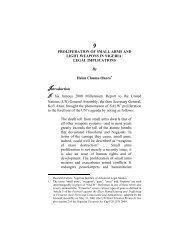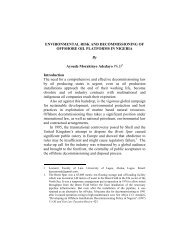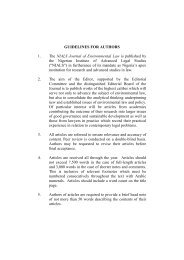DEVELOPMENT OF PLEA BARGAINING IN THE ADMINISTRATION ...
DEVELOPMENT OF PLEA BARGAINING IN THE ADMINISTRATION ...
DEVELOPMENT OF PLEA BARGAINING IN THE ADMINISTRATION ...
Create successful ePaper yourself
Turn your PDF publications into a flip-book with our unique Google optimized e-Paper software.
76<br />
NIALS Journal of Law and Development<br />
nature of the case, the availability of evidence against the<br />
accused person and several other factors. This is necessary to<br />
enable the prosecutor weigh the strength of the prosecution’s<br />
case and the chances of securing conviction. The strength of<br />
the prosecution in the negotiation process is based on the<br />
amount of evidence they have against the accused where<br />
there are loopholes in their case or they are not likely to<br />
secure a conviction on the strength of the evidence in their<br />
disposal, they are more likely to be flexible in the negotiation<br />
process. In Sivemance, the strength of the prosecution’s case<br />
will also affect the accused bargaining strength in the<br />
negotiation. The accused can decipher the strength of the<br />
prosecution’s case from reviewing all the evidence put before<br />
them. It is pertinent to state that the prosecution is obliged to<br />
serve a copy of the charge, the proof of evidence which<br />
include witness statements, forensic tests and other evidence<br />
that will be used against the accused in court. The defence<br />
counsel will then conduct his own investigations and weigh<br />
the evidence against his client before advising his client to<br />
plead guilty. 66<br />
In practice, when a person is accused of a criminal<br />
offence, he may be invited by the prosecutor to his office and<br />
then asked to plead guilty to the charge or charges or<br />
count(s). He is told clearly that if he fails to plead guilty to<br />
the charge(s) and the matter goes to trial, he would be<br />
punished severely. In a comparative study in the year 1979,<br />
William Felstiner identified the differences between the plea<br />
bargaining procedure in the U.S.A. and penal order in<br />
Germany. 67 He noted firstly that “in the United States,<br />
defendants who plead guilty are, in the aggregate, sentenced<br />
66. Ibid, at p. 42.<br />
67. Felstiner, W.L.F.: “Plea Contracts in West Germany”, 13 Law and Society<br />
Review, 309 (1979).



